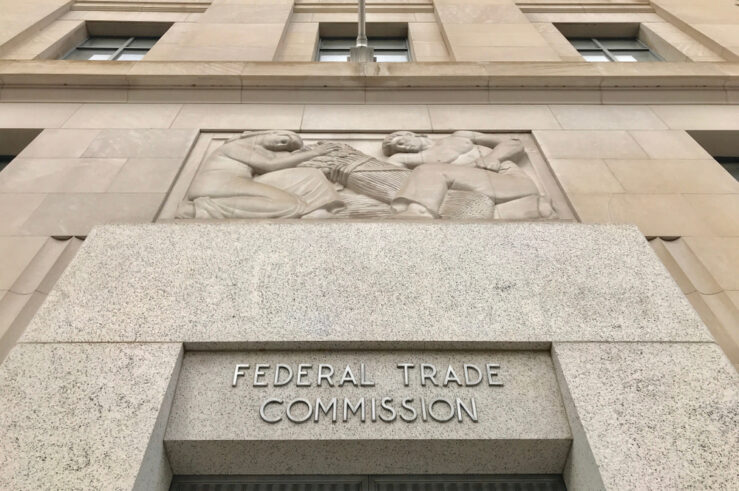Showing results for: “FTC policy statement unfair methods of competition”
FTC Rulemaking and Unintended Consequences
For obvious reasons, many scholars, lawyers, and policymakers are thinking hard about whether the Federal Trade Commission (FTC) has authority to promulgate substantive “unfair methods of competition” (UMC) regulations. I first approached this issue a couple of years ago when the FTC asked me to present on the agency’s rulemaking powers. For my presentation, I ... FTC Rulemaking and Unintended Consequences
Should the Supreme Court Grant Cert in Rambus (Revisited, and Cross-Posted at Patently-O)
[Rutgers Professor Michael Carrier recently posted as a guest at Patently-O arguing in favor of the FTC’s position in Rambus and the Supreme Court granting certiorari. I thought Professor Crouch might be interested in sharing with his readers a different perspective on the merits of the FTC’s petition for cert in Rambus sketched out in ... Should the Supreme Court Grant Cert in Rambus (Revisited, and Cross-Posted at Patently-O)
The FTC Did Not ‘Fumble the Future’ in Its Google Search Investigation
Politico has released a cache of confidential Federal Trade Commission (FTC) documents in connection with a series of articles on the commission’s antitrust probe into Google Search a decade ago. The headline of the first piece in the series argues the FTC “fumbled the future” by failing to follow through on staff recommendations to pursue ... The FTC Did Not ‘Fumble the Future’ in Its Google Search Investigation
The Internationalization of Due Process, Federal Antitrust Enforcement, and the Rule of Law
The acceptance and implementation of due-process standards confer a variety of welfare benefits on society. As Christopher Yoo, Thomas Fetzer, Shan Jiang, and Yong Huang explain, strong procedural due-process protections promote: (1) compliance with basic norms of impartiality; (2) greater accuracy of decisions; (3) stronger economic growth; (4) increased respect for government; (5) better compliance ... The Internationalization of Due Process, Federal Antitrust Enforcement, and the Rule of Law
Note to the FTC: Punishing Efficiency Means Destroying Competition
Yesterday, Lina Khan’s FTC released their long-awaited draft merger guidelines for public comment. Regrettably yet not unsurprisingly, the new guidelines are a radical departure from established case law and antitrust thinking. They’re marked by a failure to account for the role of efficiencies in the competitive process, and a failure to distinguish between the implications of generally ... Note to the FTC: Punishing Efficiency Means Destroying Competition
After Loper Bright, FTC Awaits Its Turn At-Bat
In an Agencies Roundup post several weeks ago, I revisited the Federal Trade Commission’s (FTC) newly adopted—and not-yet-effective—rule barring the use of noncompete agreements across much of the U.S. economy. It was not my first such post (my ninth, if I’ve counted correctly, and if readers will forgo armchair diagnoses of monomania). The last time ... After Loper Bright, FTC Awaits Its Turn At-Bat
James Cooper on the Limits of Section 5’s Scope Beyond the Sherman Act
The FTC has long been on a quest to find the elusive species of conduct that Section 5 alone can tackle. A series of early Supreme Court cases interpreting the FTC Act – the most recent and widely cited of which is more than forty years old (FTC v. Sperry & Hutchinson Co., 405 U.S. ... James Cooper on the Limits of Section 5’s Scope Beyond the Sherman Act
Should the Supreme Court Grant Cert in Rambus?
As noted, the FTC has exercised its right under 15 USC 56(a)(3) to petition for a writ of certiorari to review the judgment of the D.C. Circuit in its FTC v. Rambus. The FTC press release is here. The petition is here. The questions presented, as framed by the Commission are: 1. Whether deceptive conduct ... Should the Supreme Court Grant Cert in Rambus?
Noah Phillips’ Major Contribution to IP-Antitrust Law: The 1-800 Contacts Case
Recently departed Federal Trade Commission (FTC) Commissioner Noah Phillips has been rightly praised as “a powerful voice during his four-year tenure at the FTC, advocating for rational antitrust enforcement and against populist antitrust that derails the fair yet disruptive process of competition.” The FTC will miss his trenchant analysis and collegiality, now that he has ... Noah Phillips’ Major Contribution to IP-Antitrust Law: The <em>1-800 Contacts</em> Case
The FTC Should Not Enact a Deceptive or Unfair Marketing Earnings-Claims Rule
Back in February 2022, the Federal Trade Commission (FTC) announced an advance notice of proposed rulemaking (ANPRM) on “deceptive or unfair earnings claims.” According to the FTC: [The Deceptive or Unfair ANPRM was aimed at] challenging bogus money-making claims used to lure consumers, workers, and prospective entrepreneurs into risky business ventures that often turn into ... The FTC Should Not Enact a Deceptive or Unfair Marketing Earnings-Claims Rule
Lessons from Korea’s Roller-Coaster Ride Toward Platform (Non)Regulation
The Korea Fair Trade Commission (KFTC), the nation’s competition authority, announced Sept. 9 that it had abandoned plans for comprehensive platform regulation modeled after the European Union’s Digital Markets Act (DMA) or Section 19a of Germany’s Competition Act. The proposed Korean regulation would have involved an ex-ante designation process, alongside stringent prohibitions. The KFTC noted ... Lessons from Korea’s Roller-Coaster Ride Toward Platform (Non)Regulation
The FTC Abandons the Free Market
In December 2021, the Federal Trade Commission (FTC) released its statement of regulatory priorities for 2022, which describes its intention to expand the agency’s rulemaking activities to target “unfair methods of competition” (UMC) under Section 5 of the Federal Trade Commission Act (FTC Act), in addition to (and in some cases, presumably in place of) ... The FTC Abandons the Free Market











